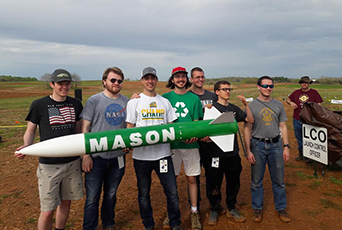
Mason's Rocketry Club landed two first place awards in the Battle of the Rockets Competition. Pictured from left to right: Alex Maxseiner, Joe Coffin, Peter Goffe, Will McCarty, Eric Dau, Gary Quaresima, and Zac Yarashus.
Mason’s Rocketry Club captured first place awards in the target altitude event and the Mars rover challenge at the Battle of the Rockets Competition.
This is the second year the group won first place in the target altitude event.
Students from several engineering disciplines teamed up to make the rockets and rover, says Alex Maxseiner, president and founder of the club and a senior in computer engineering.
“We put in a lot of hard work, especially for the Mars rover (robot) challenge,” says Peter Goffe, the club treasurer and a junior majoring in mechanical engineering.
The target altitude event’s objective was to fly a rocket as close as possible to 1,001 feet. The club got three shots at reaching that goal; scoring is based on their best two attempts. Mason’s team was off by only 26 feet in its best two shots.
“Our new members took what we have learned from our experiences and were able to build a very consistent rocket, improving our score from last year,” Maxseiner says.
For the Mars rover (robot) challenge, the team designed a rocket and put a Mars rover inside. The rocket flew more than 1,000 feet, then deployed the rover, which landed safely using its parachute recovery system.
“It’s a little stressful when you are watching the rocket launch,” Goffe says. “If something malfunctions and falls without its recovery system, it’s unsalvageable for the competition. We focused on completing the simple tasks one hundred percent of the time.”
The club members built three rockets this year, working more than two months on that portion of the project. They had several practice launches before the competition, which was held April 13-14 in Culpeper, Virginia.
Maxseiner founded the club in 2016 because he and his peers wanted to get hands-on experience with their classroom work
Faculty advisor Harold A. Geller, Mason's Observatory director, has mentored the group, which welcomes people from all academic backgrounds. They’re looking for younger students to take over, “because most of us are seniors, and we want the club to live on after we graduate,” Maxseiner says.
